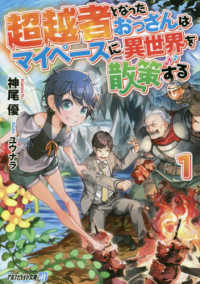- ホーム
- > 洋書
- > ドイツ書
- > School & Learning
Full Description
Written specifically for researchers of all disciplines whose first language is not English, this guide presents easy-to-follow rules and tips, along with authentic examples taken from real emails, referees' reports and cover letters, will show you how to:
write effective emails (subject lines, structure, requests, level of formality)
review other people's manuscripts
reply effectively and constructively to referees' reports
correspond with editors
write letters regarding summer schools, internships, and PhD and postdoc programs
write reference letters
This new edition contains over 40% new material, including stimulating factoids and discussion points both for self-study and in-class use, as well as suggestions for drafting proposals for research projects and writing research statements.
EAP teachers will find this book to be a great source of tips for training students, and for providing both instructive and entertaining lessons.
Other books in the series cover: writing research papers; presentations at international conferences; English grammar, usage and style; and interacting on campus; plus exercise books and a teacher's guide to the whole series.
Please visit http://www.springer.com/series/13913 for a full list of titles in the series.Adrian Wallwork is the author of more than 30 ELT and EAP textbooks. He has trained several thousand PhD students and academics from 35 countries to write research papers, prepare presentations, and communicate with editors, referees and fellow researchers.
Contents
1. Subject Lines.- 2. Salutations.- 3. Structuring the content of an email.- 4. Building a Relationship and Deciding the Level of Formality.- 5. Language, Translating and Spelling.- 6. Requests and Replies.- 7. Cover letters for summer schools, internships, placements, Erasmus, PhD / MA / Postdoc programs.- 8. Reference letters.- 9. Brief notes on writing research proposals and research statements.- 10. How to criticize constructively.- 11. Writing a Peer Review.- 12. Writing a Reply to the Reviewers' Reports.- 13. Communicating with the Editor.- 14. Useful phrases.- 15. Tense Usage.








